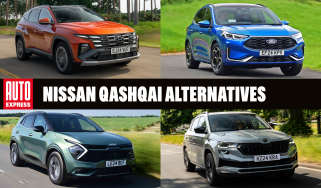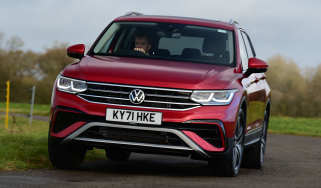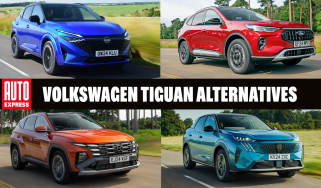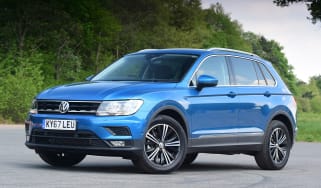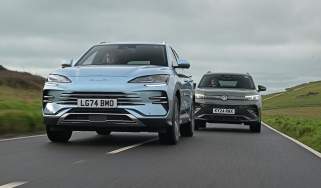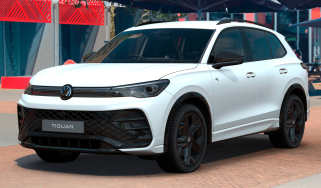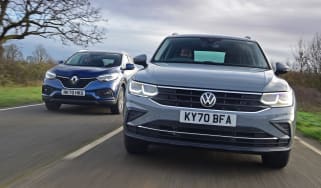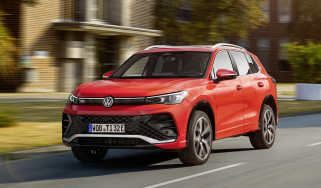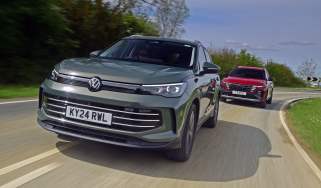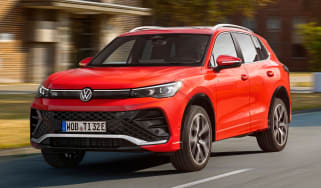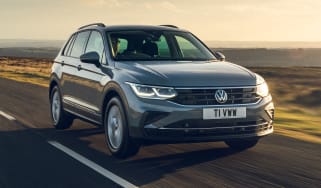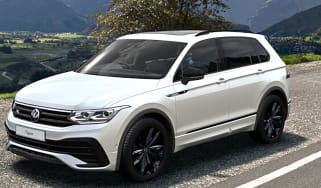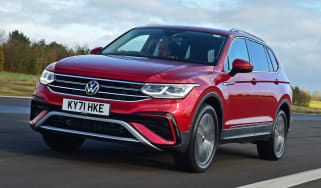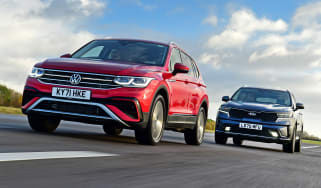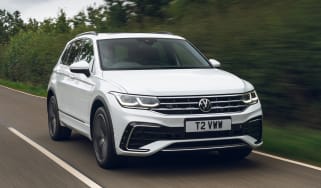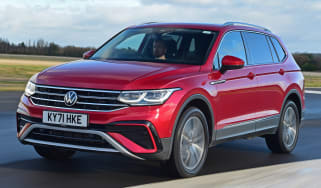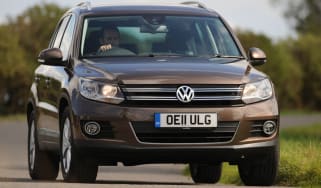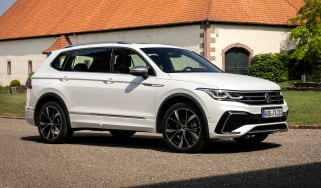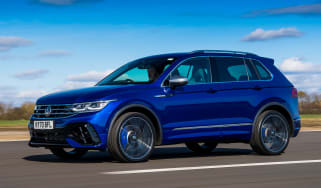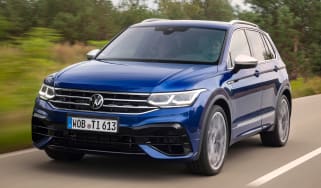Volkswagen Tiguan review
Third generation Volkswagen Tiguan is a big-selling SUV that’s practical, refined, and benefits from VW’s latest hybrid engines

Is the Volkswagen Tiguan a good car?
If you’re looking for a practical, nicely finished, efficient and refined mid-sized SUV, then the Volkswagen Tiguan ticks all of those boxes. And if you need low company car tax costs, but an EV doesn’t suit your lifestyle, then you should consider the excellent plug-in eHybrid model.
The Tiguan isn’t as engaging to drive as a Ford Kuga, and high prices at the top of the range mean it doesn’t offer the same value as a Hyundai Tucson or one of the new wave of Chinese arrivals, such as the BYD Seal U, for example. But the Tiguan has won many fans over the years thanks to its all-round ability, as well as the attraction of the VW badge on its nose.
| Key specs | |
| Fuel type | Petrol, plug-in hybrid, diesel |
| Body style | 5dr SUV |
| Powertrain | 1.5, 4cyl, turbo, petrol, front-wheel drive 2.0, 4cyl, turbo, diesel, front-wheel drive 2.0, 4cyl, turbo, petrol, four-wheel drive 1.5, 4cyl, turbo, petrol plus 1x e-motor, front-wheel drive |
| Safety | Five-stars (2024) |
| Warranty | 3yrs/60,000 miles |
How much does the Volkswagen Tiguan cost?
Not many brands sell a nameless entry-level trim, but that’s what you get with the Volkswagen Tiguan. It has a £34,000 price tag and is only offered with the 128bhp 1.5 TSI engine, but it still comes with a 12.9-inch touchscreen, front and rear parking sensors and a reversing camera, while the modest 17-inch wheels should help it deliver the best ride of any Tiguan in the line-up.
For £2,000 extra you can choose Life trim with the same engine. This adds 18-inch alloys, power lumbar support, adaptive cruise control and three-zone climate control, among other luxuries. There’s also the choice of a 148bhp 1.5 TSI for an extra £800 or so, or a 2.0 TDI with the same 148bhp for an extra £2,000 over the 128bhp TSI. Life trim is also the entry level for the 201bhp 1.5 TSI eHybrid, which has a price tag of around £43,000.
Used - available now

2020 Volkswagen
Tiguan
37,098 milesAutomaticPetrol1.5L
Cash £17,399
2020 Volkswagen
Tiguan
27,701 milesAutomaticPetrol2.0L
Cash £24,099
2020 Volkswagen
Tiguan
20,321 milesAutomaticPetrol1.5L
Cash £18,900
2020 Volkswagen
Tiguan
53,307 milesAutomaticDiesel2.0L
Cash £22,742Match trim adds an electric tailgate, privacy glass, and keyless entry and start for less than £200 over Life models, while Elegance cars ramp up the luxury, with kit such as 19-inch alloys, a 30-colour ambient interior lighting, heated front seats with a massage function, and a 360-degree camera system. Prices start from just under £40,000 for Elegance spec, but you can’t get it with the 128bhp TSI engine.
R-Line is priced similarly to Elegance from around £40,000, while the Black Edition is a visual upgrade on top of R-Line for around £1,000 more. These both come with sportier exterior and interior styling, 20-inch alloys and sports front seats. These are the only trims available with the more powerful 268bhp eHybrid plug-in powertrain. If you’re looking for 4MOTION four-wheel drive, then a 2.0 TSI petrol is offered with 201bhp or 261bhp, and prices of around £45,500 and £48,500 respectively. Every version of the Tiguan is equipped with a DSG twin-clutch automatic transmission – there are no manual gearboxes available.
If you’re waiting for the return of the seven-seat Tiguan Allspace, then you’re out of luck. Instead VW has launched the Volkswagen Tayron as a separate model to rival the likes of the Skoda Kodiaq and Peugeot 5008.
However, it’s the Allspace in all but name, and uses the same powertrains as the Tiguan, including the eHybrid. As with the Kodiaq, the plug-in Tayron is five-seat only. In the US, the Tayron is badged as the Tiguan, because the smaller model offered in the UK isn’t sold there.
Engines, performance & drive
Petrol power for the Volkswagen Tiguan comes from the company’s 1.5 TSI turbo four-cylinder in 128bhp or 148bhp forms, with the former only offered in lower specs. Further up the range, a 2.0 TSI is available in R-Line and Black Edition models, with 201bhp or 261bhp and 4MOTION four-wheel drive as standard for both engines.
Diesel fans have access to a 148bhp 2.0 TDI in the majority of specs, while the eHybrid uses a 1.5 TSI petrol engine combined with an electric motor and 25.7kWh battery. The engine is largely the same as the petrol model’s except it runs slightly differently to boost efficiency, while the electric motor is integrated into a bespoke six-speed twin-clutch gearbox.
Two power outputs are offered – 201bhp or 268bhp – although unlike the similarly powerful 2.0 TSI models, the eHybrids are front-wheel drive, as with the rest of the range. All versions of the Tiguan come with automatic gearboxes – there are no manuals.
| Model | Power | 0-62mph | Top speed |
| Tiguan 1.5 eTSI 130 DSG | 128bhp | 10.6 seconds | 123mph |
| Tiguan 2.0 TSI 265 DSG | 148bhp | 5.9 seconds | 150mph |
| Tiguan 2.0 TDI 150 DSG | bhp | 9.4 seconds | 129mph |
What is the Volkswagen Tiguan like to drive?
There’s a firm edge to the Tiguan’s ride, especially in higher-spec cars, but overall it’s comfortable and easy to get along with.
Ultimately, the Tiguan is never going to be a car for keen drivers, but clever software means it’s safe and secure even if you take a corner a little too quickly. It’ll satisfy the needs of the majority in everyday driving, providing a grippy chassis and precise steering. There’s perhaps a little more body lean in bends than you’ll find in a Ford Kuga or SEAT Ateca, while the ride could do with being a bit more comfortable.
In town
Responsive controls and sure-footed handling mean that the Tiguan is easy to drive in urban areas, although bumps do tend to thump into the cabin – smaller wheels should make things smoother. All versions come with front and rear parking sensors and a reversing camera, while higher-spec variants add kit such as a 360-degree camera and remote parking tech.
The eHybrid offers quiet and refined running when fully charged, and it’s responsive to inputs without resorting to petrol power if there’s enough capacity left in the battery. But once the engine does cut in, the experience isn’t quite so smooth. The transition between electric and combustion drive is jerky, and at low speeds (when exiting a junction, for example) the VW can hesitate as it decides which power source to use.
The auto-hold handbrake adds to the jerkiness, because it needs a firm prod of the accelerator to disengage, which causes the Tiguan to lurch forward as the power comes in – we’d recommend leaving the system off for a smoother drive.
On A- and B-roads
At higher speeds the Tiguan’s firm ride softens off, and the car offers positive responses, with direct steering that is short on feedback but has decent weight. There’s stiffer suspension for R-Line trim that feels a bit harsher than the standard car’s, but for the best experience we would recommend upgrading to the £1,025 Dynamic Driving Package. This includes Adaptive Chassis Control that comes with adjustable dampers, which can be set from soft to firm and deliver better comfort than the standard set-up, although overall it’s still on the firm side.
The eHybrid favours electric drive as often as possible, but when the engine does cut in, it’s by no means harsh. The extra weight of the hybrid system doesn’t have much of a detrimental effect on handling, either.
On the motorway
With a fairly even split in power delivery from the electric motor and engine, the Tiguan will favour electric drive even at higher speeds. It’s only when accelerating on slip roads that the engine is most vocal, but even then it’s far from being harsh.
The firm edge to the VW’s ride is still present at motorway speeds. Higher-spec cars on larger wheels suffer from a bit of road noise, too, although it’s not loud enough to make conversation with passengers difficult.
Engines, 0-60 acceleration and top speed
The Volkswagen Tiguan’s acceleration times start with the 128bhp 1.5 eTSI, which manages 0-62mph in 10.6 seconds and has a top speed of 123mph. Our preferred engine is the 148bhp 1.5 eTSI, and its extra power and torque (250Nm versus 220Nm) trims the acceleration time to 9.1 seconds, while the top speed rises to 130mph. It’s a responsive engine, and it works well with the standard seven-speed DSG automatic gearbox.
The 2.0 TDI diesel also gets 148bhp, but has 360Nm of torque. However, it isn’t as responsive as the petrol, so 0-62mph takes 9.4 seconds. This engine’s talents lie in offering low-rev grunt (maximum torque arrives at 1,600rpm) and the ability to tow heavier trailers or caravans. Top speed is 129mph.
VW’s 4MOTION four-wheel drive is available with VW’s 2.0 TSI petrol in two power outputs. The first comes with 201bhp and 320Nm of torque for 0-62mph in 7.1 seconds and a 142mph top speed. Those after the fastest Tiguan will want the 261bhp version, which rattles off the 0-62mph dash in 5.9 seconds and has a top speed of 150mph.
A more affordable bet for company car drivers will be one of the two plug-in eHybrid models with either 201bhp or 268bhp. The former manages 0-62mph in 8.2 seconds, while the most powerful eHybrid will do it in 7.2 seconds. Unlike the 2.0 TSIs, these two models only come with front-wheel drive.
MPG, emissions & running costs
Premium aspirations mean that Volkswagen Tiguan prices are steeper than they are for some rivals, although they’re still below the likes of the BMW X3 and Mercedes GLC.
Economy figures for the engine range start with a combined figure of 46.3mpg for the 1.5 eTSI 130, while the more powerful 1.5 eTSI 150 has a slightly poorer quoted figure of 45.3mpg. These economy figures beat those of the rival Ford Kuga, Hyundai Tucson and Kia Sportage when equipped with similarly sized petrol engines.
The larger 2.0 TSI petrol is thirstier and has the added drain of 4MOTION four-wheel drive. The 201bhp version manages 36.4mpg, while the more powerful model has a combined figure of only 33.2mpg. The 148bhp 2.0 TDI diesel is the most efficient non-plug-in Tiguan, returning up to 52.2mpg combined. As with all the other engines, this is the best combined figure that’s quoted by VW, and returns vary depending on trim level and wheel size.
The eHybrid version commands more money for its plug-in technology, but everyday running costs should be decent. VW quotes astronomical figures ranging from 647-715mpg for the plug-in hybrid Tiguans, but of course what you achieve in the real world will depend entirely on how often you charge the battery. Run it down, and once below 15 per cent capacity the PHEV’s electronics will favour petrol power to save the charge. Drive the Tiguan eHybrid like this, and you can expect fuel economy of around 35mpg. A small 45-litre fuel tank means the petrol range is short, which further emphasises the need to charge the battery on a regular basis.
| Model | MPG | CO2 | Insurance group |
| Tiguan 1.5 eTSI 130 DSG Life | 46.3mpg | 139g/km | 18E |
| Tiguan 1.5 eHybrid DSG Life | 706.2mpg | 9g/km | 27E |
| Tiguan 2.0 TDI 150 DSG Life | 52.3mpg | 141g/km | 22E |
Electric range, battery life and charge time
Keep the 25.7kWh pack (19.7kWh useable) topped up, and according to VW you should see an all-electric range of 77 miles from the 201bhp model, or 75 miles for the faster 268bhp car. When we tested the more powerful model in cold conditions, we saw a maximum range of 55 miles from the car’s trip computer, although this will change according to the type of driving that you do. That’s quite a lot further than the up to 42 miles you can get out of a 2.5 PHEV plug-in Ford Kuga.
Volkswagen equips its eHybrid powertrain with fast DC charging of up to 50kW, and from a powerful enough source the battery can go from 10-80 per cent capacity in 26 minutes. The latest-generation PHEV system also has 11kW AC charging (up from 3.7kW before), which can take the battery from flat to full in two and a half hours.
Exclusively rapid charging your plug-in hybrid would be costly in the long run, so most people will likely utilise a 7.4kW wallbox charger at home. The official charging time at 7.4kW has yet to be released, but we expect it to be around four hours, a figure we’ve been given for the eHybrid Volkswagen Passat, which uses the same battery pack size.
The battery pack in the eHybrid model is covered by a separate warranty, which guarantees that the battery will maintain above 70 per cent capacity over five years or 100,000 miles. However, it only applies to the first owner of the car and is non-transferable to subsequent owners.
Tax
Official emissions figures of 9-10g/km for the Tiguan eHybrid mean it’s competitive as a company car thanks to being in a competitively low Benefit-in-Kind (BiK) company car tax bracket. The more powerful model has similar figures to the 201bhp version, although high list prices counter that.
All eHybrid models cost in excess of £40,000, as do the higher-powered 2.0 TSI petrol and the higher-sec diesels, so the luxury-car road tax premium is applied. The status of the eHybrid as a PHEV knocks a paltry £10 off the annual cost for the first five years.
Insurance groups
Adding a complex hybrid powertrain to the Tiguan sees insurance groups rise to the 27-31 range for the eHybrid variant, which is six or seven groups higher than the less powerful petrol and diesel models. The highest-ranked model is the most powerful 2.0 TSI, in Group 32.
For comparison, a Ford Kuga starts in group 16, and goes up to 26, while the Hyundai Tucson starts in group 18, before going up to group 24 for a top-of-the-range Ultimate PHEV with four-wheel drive.
Depreciation
Residual values in the 55 per cent bracket mean that the Tiguan eHybrid is a better performer than the combustion-engined versions of the car, which fall in the region of 50 to 53 per cent – the attraction of low company car costs is sure to help the eHybrid’s higher figures.
To get an accurate valuation of a specific model, check out our free car valuation tool...
Interior, design & technology
The latest Volkswagen Tiguan doesn’t exactly push the envelope in terms of looks – at first glance, you might even mistake it for the outgoing model. But playing it safe with the Tiguan’s styling makes a bit more sense when you factor in that this is VW’s best-selling model globally.
Jump inside, and the first thing that strikes you is that the interior is almost a carbon copy of the Volkswagen Passat, with a 12.9-inch central touchscreen screen and 10.25-inch ‘Digital Cockpit Pro’ driver’s display provided as standard (although the car featured in the pictures has the optional Infotainment package plus for £1,100, which is available from Life trim and above and comes with a larger 15-inch screen).
We know Volkswagen is reverting to more physical controls in its cabins after years of heavy criticism of its touch-sensitive sliders, although the latest Tiguan has arrived too soon for this change of heart. The slider beneath the screen is at least backlit, and the revised set-up allows you to skip to a certain volume or temperature by using two fingers on the panel. We approve of having physical buttons on the steering wheel once again compared with the touch-sensitive ones that you could accidentally hit while turning the wheel.
The entry-level ‘Tiguan’ trim looks a little dull inside, but should get the same solid feeling we found in high trim levels. Next up is Life with a ten-colour ambient lighting system, followed by mid-range Match trim with laminated rear privacy glass. The plush Elegance trim has a 30-colour ambient lighting system as well as heated and massaging front seats and a 360-degree camera set up. Finally, R Line gains more heavily contoured sports seats, and some sportier-looking exterior and interior styling tweaks.
What is the interior quality like?
The fit and finish are decent inside, with soft-touch plastics and gloss black trim around the cabin and a flock lining for the door bins to stop items rattling around. Higher-spec cars feature LED ambient lighting across the dashboard and doors that can be changed to different colours.
This generation of Tiguan is the first to introduce VW’s driving experience switch. You get a rotary dial on the centre console which has various functions, including toggling between some pre-configured ‘atmospheres’. These presets combine ambient lighting (part of which comes from a patterned finish on the dashboard panel) and audio functions to offer different moods, be it calm, energetic, or something in between. We found the dial more useful for one of its other functions, which is as a simple rotary volume control.
Sat-nav, stereo and infotainment
The Tiguan’s dashboard layout makes use of the touchscreen for most of its operations, with a 12.9-inch display as standard and a large 15-inch screen offered as an option. Both look sharp, with high-resolution graphics, while the standard-fit 10.25-inch digital dial cluster adds to the hi-tech feel of the cabin. The larger screen also comes with a helpful head-up display, which projects important information, such as speed onto the windscreen within the driver’s line of sight.
Whether you stick with the standard display or upgrade, the Tiguan’s logical layout and menu system are easy to use, with climate shortcuts at the bottom and a strip across the top for quick access to common functions.
The sliding temperature and volume controls still need a knack to get them to work properly, though, while VW’s always-listening “Hey Ida” voice control prompt is too easy to activate accidentally when in conversation with passengers – you could be talking just for the car’s voice system to butt in and ask what you want when you’ve done nothing of the sort.
Wireless Apple CarPlay and Android Auto phone connectivity are standard, but you’ll need the Infotainment package to get wireless charging pad on the entry-level trim, or step up to Life trim. An eight-speaker audio setup is standard, but for around £1,400 you can add a 700-watt, 10-speaker Harman Kardon system.
Boot space, comfort & practicality
The Volkswagen Tiguan continues as a spacious five-seat mid-size SUV, but if you're looking for the stretched seven-seat version, you’ll have to wait for the arrival of the Volkswagen Tayron – the replacement for the previous Volkswagen Tiguan Allspace.
The Tiguan is one of the most spacious cars in its class, both for passengers and their belongings. A pair of adults should find plenty of space up front in the Tiguan, while visibility is better than the class average thanks to a relatively straight bonnet, which gives a decent clue about where the front end stops, and large side windows mean respectable over-the-shoulder visibility. A blind spot monitoring system is standard to warn you of vehicles lurking where you can’t see them.
All versions come with front and rear parking sensors, plus a reversing camera, while Elegance trim (and cars equipped with the optional Driver assistance package from Life trim and above) have a 360-degree camera system. All Tiguans have LED headlights, but you can specify the optional IQ.Light Matrix LED headlights to improve night driving because it’ll accurately shoot beams of light between cars ahead of you to avoid dazzling oncoming traffic, and the system will also do tricks such as light up your lane on dark motorways, or project warnings onto the road surface ahead of the car, just like the Mercedes Digital Light system. It costs an eye-watering £2,400, and you have to have the £950 Driver assistance pack with it, though.
A full-size spare wheel is available for £350.
| Dimensions | |
| Length | 4,539mm |
| Width | 1,842mm |
| Height | 1,660mm (1,658mm eHybrid) |
| Number of seats | 5 |
| Boot space | 652-1,650 litres (eTSI, TDI) 490-1,486 litres (eHybrid) |
Dimensions and size
The Tiguan comes in at 4,539mm long, 1,660mm tall (1,658mm for the eHybrid), and 1,842mm wide (1,859mm for the R Line), which puts it between the Hyundai Tucson and Ford Kuga in terms of size.
How practical is the Volkswagen Tiguan?
Seats & space in the front
There’s plenty of steering wheel and seat adjustment to find a decent driving position, while some versions of the Tiguan feature ergoActive seats that boost long-distance comfort.
Storage is reasonable, although there’s no stowage room beneath the centre armrest – the space is open but features movable dividers that can be used as cup-holders and also feature a bottle opener. The front door bins are a decent size, as is the glovebox.
Seats & space in the back
Raised rear seating boosts the view forwards for back-seat passengers, but while the outer rear seats are roomy, the middle chair is a little cramped. It’s not helped by the transmission tunnel getting in the way, but at least there’s decent foot space under the front seats. Plus the seat backs can be reclined slightly for added comfort.
Three-zone climate control means those in the back can set their own temperature, while a pair of USB-C sockets are also included. There are three sets of Isofix points for fitting child seats, two in the rear and one on the front passenger seat.
The Tiguan comes with ISOFIX child seat mounting points on the outer positions of the rear bench, plus another on the front passenger seat, making it a little more flexible in terms of where you can fit car seats.
Boot space
There’s a 652-litre boot in the back of the Tiguan, which isn’t far off of the brand’s practical Volkswagen Passat estate car, and is a bit more than you’ll find in a Ford Kuga, Renault Austral or Toyota RAV4. Handy release levers just inside the boot drop all the seats easily, and the capacity increases to 1,650 litres, which is still more than in a Kuga.
The Tiguan has a sliding and reclining rear seat, and 40:20:40 folding means there’s flexibility when carrying people and longer items. A selection of side cubbies can hold smaller items, and there’s plenty of under-floor storage space in the petrol and diesel variants.
Compromises have been made to fit the eHybrid system into the Tiguan, and it’s the boot that bears the brunt of this. A cargo capacity of 490 litres is well down on the 652 litres offered in the standard model, but that’s still one of the better figures among its PHEV rivals – for example, the PHEV-only BYD Seal U has a capacity of only 425 litres. The VW’s floor is level with the low load lip, too, which helps with access. Maximum capacity of 1,486 litres with the back seats folded isn’t bad, but is 164 litres down on the non-hybrid Tiguan.
Towing
The best Tiguan for towing is the 2.0 TSI petrol with 4MOTION, which can haul a braked trailer or caravan of up to 2,200kg, irrespective of which power output you choose. Both the 2.0 TDI and 272 eHybrid have the next highest towing capacity of 2,000kg. The 1.5 eTSI 150 and 204 eHybrid can manage to pull a braked trailer or caravan of up to 1,800kg. The 1.5 eTSI 130 is the least capable at 1,600kg, but that’s still enough for a decent-sized caravan.
In comparison, the revised Ford Kuga can manage up to 2,100kg when equipped with the 2.5 PHEV plug-in hybrid, or four-wheel drive version of 2.5 FHEV. Fitting a tow bar to the Tiguan costs over £1,000.
Reliability & safety
Since VW’s eHybrid system is in its second generation, any teething troubles with the original set-up should have been ironed out. The system is also used in a number of VW Group PHEVs, so there should be strength in numbers in terms of dependability.
It’s too early for the latest Tiguan to appear in the Driver Power customer satisfaction survey, but VW as a brand needs to do more to keep its customers happy. It dropped a further two places from its 2023 score to come in 29th out of 32 manufacturers in the 2024 results. It only just beat rival Ford (30th) and was outperformed by stablemates SEAT (24th) and Skoda (23rd), and was a long way behind Hyundai (17th), Toyota (8th) and Kia (3rd).
The Tiguan earned a full five-star Euro NCAP rating in 2024, with high scores in all categories. Every model features adaptive cruise control, driver fatigue detection, road-sign recognition, automatic main beam, lane-change assist, oncoming vehicle braking and rear cross-traffic alert.
| Key standard safety features | Euro NCAP safety ratings |
|
Warranty
There’s a standard three-year/60,000-mile warranty with the Tiguan, which is behind the best cover offered by the likes of Hyundai, Kia and some Chinese brands. It also doesn’t even last as long as the five-year or 90,000-mile policy offered by fellow Volkswagen group stablemate, Cupra. You can add an extended warranty, but for extra cost. VW offers a hybrid battery degradation warranty that lasts for five years or 100,000 miles, but this is non-transferable beyond the first owner.
Servicing
VW offers service plans that suit your car and mileage, with an oil inspection service at 12 months, then a full service at 24 months or 18,600 miles, whichever comes sooner. A two-year plan for the Tiguan eHybrid costs around £500.
Volkswagen Tiguan alternatives
The Tiguan is one of Volkswagen’s best-selling models, but it’s far from a dominant force in the compact SUV sector, because there are scores of rivals to choose from. The latest Tiguan is priced towards the upper end of the sector, but not quite on a par with the likes of the BMW X3 and Mercedes GLC.
Rivals include staples of the class such as the Ford Kuga, Honda CR-V and Toyota RAV4, while slightly cheaper options such as the Hyundai Tucson, Kia Sportage, Nissan Qashqai, Renault Austral and Vauxhall Grandland offer better value for money. Some of these rivals offer plug-in hybrid or all-electric options, while a newcomer to the class is the BYD Seal U, which is purely a plug-in hybrid.
Frequently Asked Questions
The standard Volkswagen warranty is three years or 60,000 miles, whichever comes first. This is merely average, when several manufacturers can provide five years of coverage or more.






